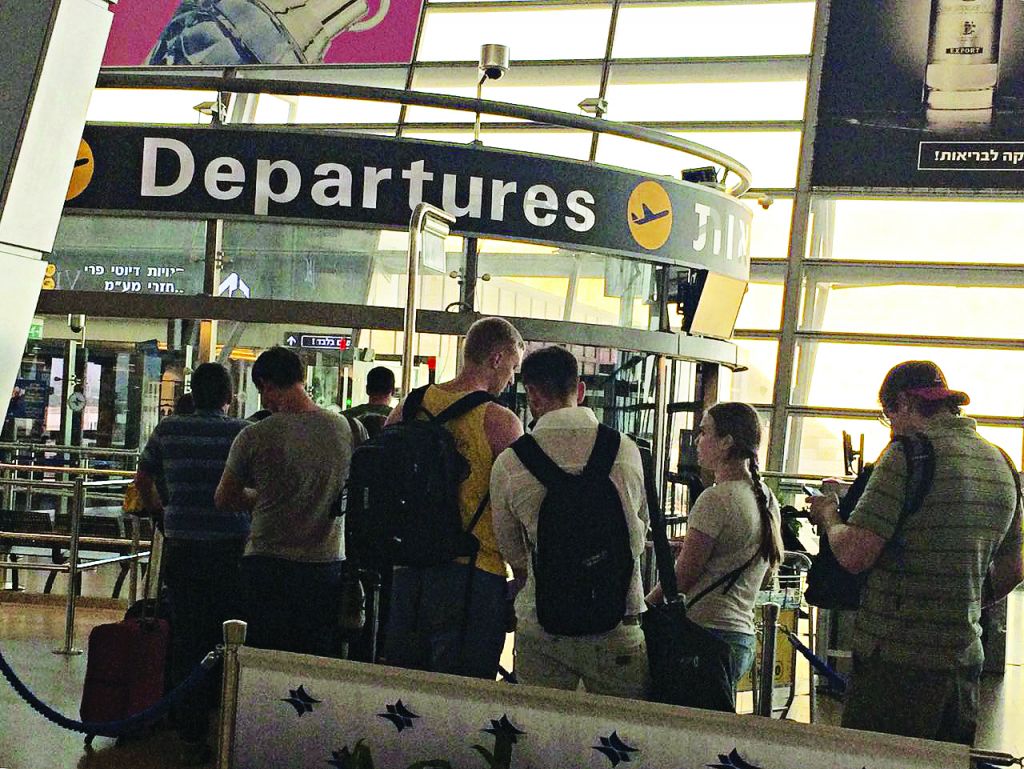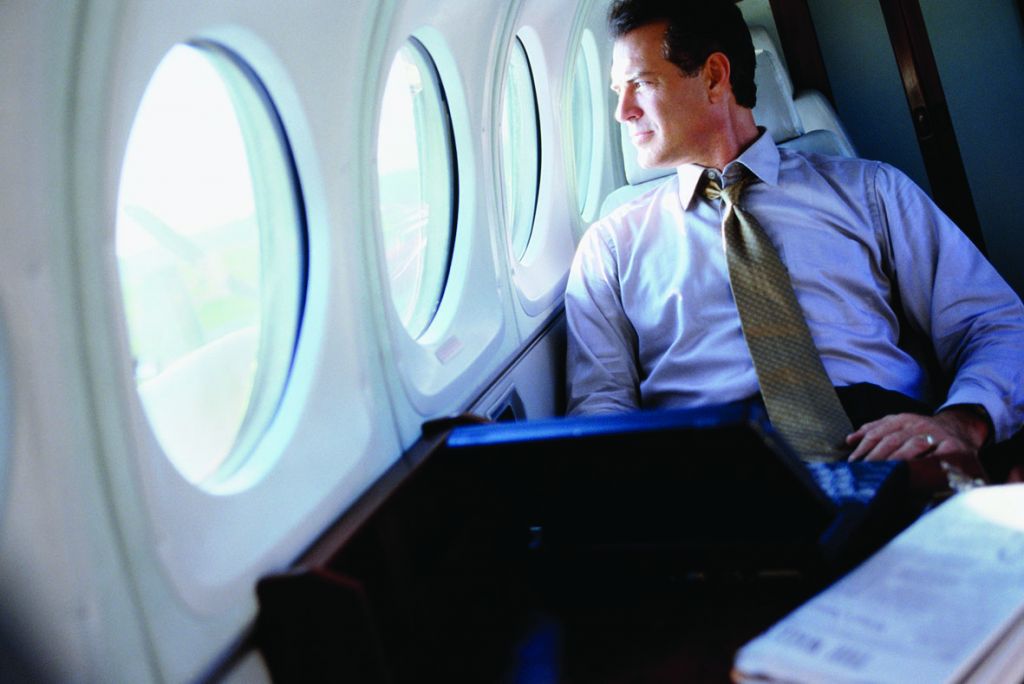Special report: Live in Israel… Work in the UK!
Forget your crowded early-morning train ride. For some people, travelling to and from work presents a whole new challenge
Heathrow Airport, on a typical Thursday night: it’s eerily quiet at the boarding gate for the 22:40 British Airways flight to Tel Aviv. A scattering of Israeli tourists are heading home with souvenir bags from Harrods and Primark. But most of the travellers wear the bored, glazed expressions of Tube passengers.
Apart from announcements over the loudspeaker, the only sounds are the occasional rustle of a newspaper or the soft chimes of laptops and iPads being put to bed for the night.
“Nobody speaks,” confirms ‘David’, a regular on this Thursday-night “red eye” flight to Tel Aviv. “If you see someone you recognise you just nod. But you try not to make eye contact.
Get The Jewish News Daily Edition by email and never miss our top stories Free Sign Up
“Once I’m on the plane I tell the crew not to disturb me with food. I try to sleep the whole time on the plane.”
David (not his real name) is a senior consultant in the NHS. Come Monday morning, after a weekend at home with his family, he’ll see many of his fellow passengers at Ben Gurion checking in for the return flight.
He’s one of an extraordinary number of people who have made aliyah but kept their jobs in the UK. We begin our interview via Whatsapp, while he’s still on the Heathrow Express. An hour later, he’s at his London pad.

“It’s workable,” he insists. “When I’m here I see my patients. I’m in the hospital from 7am until 5pm; then I see private patients from 5pm until 8pm. That’s it, from Monday morning until Thursday night. There’s no concept of going home. I’m here to work and that’s it.”
David, his wife and three children emigrated to Ra’anana from north London seven years ago. From the outset, the family decided David would commute to London, staying with relatives during the week and returning to spend Shabbat with the family. In practice, it’s three weekends out of four. On the weekends when David is “on call” he has to stay in London.
“I’ve turned down work in Israel,” he says. “For one thing there’s the language barrier. Mainly it was that I’ve qualified into the English system.”
He’s not alone. Many doctors and dentists, lawyers and entrepreneurs have opted for the higher financial rewards and career stability of the commuter life – there’s even a Hebrew phrase for it, “Al Ha Kav”, or “on the line.” Nearly all the commuters are in their forties, male, and married with children.
“I know two guys who’ve been doing it for 20 years,” David says.
He doesn’t want to give his name, incidentally, not because his bosses might find out (they already know) but because “patients invariably Google me before they come to see me for the first time. And it won’t look great if they see I live overseas.”
Some commuters keep their relocation a secret. “My clients did used to wonder why I was a bit suntanned in the winter,” reminisces Mark Verstandig, who did the weekly commute from Netanya to north London for 13 years. As an internal accountant for a law firm, he simply never mentioned to his blue-chip clients that he had emigrated.
“They all thought I was in Edgware,” he says. “I got away with it for five years. I had a worry that they wouldn’t understand why I was living in what they thought was a war zone.”
Five years in, terrified they were going to find out anyway, he decided to confess: “I called them into a meeting and said, ‘I need to tell you something about my lifestyle’. I told them, and they didn’t give two hoots.”
Verstandig made aliyah with his wife Meryl and their four children. Their fifth child was born in Israel. It was tough, he admits, coming home exhausted at the end of a hard week. He did feel guilty at leaving Meryl to be a single parent when he wasn’t around.
“My travel agent, Rosie, used to remind me when it was my wife’s birthday and our anniversary. Coming back every Friday with a gift and taking them out for breakfast or whatever, it just wasn’t enough,” he says.
“You do have to be very organised,” agrees Danielle Nagler, a legal business consultant who, as far as she can tell, is the only regular female commuter in the 22:40 BA lounge on a Thursday night.
“I schedule my meetings when I know I’ll be in London. I have to do as much advance planning as possible.”
She made aliyah two years ago with her husband and three children. “In a way it’s great, because I can keep my job, my career, and I get to stay in proper contact with my friends and my parents,” she says.
“At the same time, I am around for my kids; it means I do know what they’re up to on a day-to-day basis.
“And yes, it is exhausting. I get home on Friday morning and go to bed for an hour, then I get up and start cooking for Shabbat.”
Before she goes away, she leaves husband Johnny with strict instructions as to the content of the fridge, the schedule for the week, carpool arrangements and so on.
It doesn’t always go smoothly. As Nagler says, “I’ll get back and be like, ‘why didn’t you finish the chicken I left for you?’ and he’ll say, ‘oh, we had sushi or pizza instead’.”
After 13 years “Al Ha Kav”, Verstandig gave up the long-distance commute and started a property business in Israel.
“I was missing out on home life,” he says. “I wanted to get a little bit in before it was too late. Also, the airlines were getting more expensive. Even with the gold and silver and diamond programmes. It was getting harder and harder.”
Back to ‘David’. “I had an arrangement with a bloke called Phil for a year,” he tells me.
“BA offered free upgrades to the gold lounge if you registered as a couple. As a commuter, you spend a lot of time looking for free upgrades. So we registered as a couple.”
When he’s in London, David gets up at 5am to Skype his children back in Raanana. They learn mishnah every day with him, via Skype.
Back at home in Israel, Sundays are devoted to tasks like meetings at school or other necessities. On Sunday nights, he cooks family dinner.
“The reality is I see my kids more now than I would if I was working in the same country,” he says. “You just have to accept you’re not there for the minor crises.
“They phone me, but it’s difficult. I can’t give support, only sympathy. By the time I get back, it’s all blown over.”
The waiting game – passengers on the ‘red-eye’ to Tel Aviv prepare to board a night flight
Sea, sun and sand – the allure of Israel is a big factor for those who decide to live there, work here

Thank you for helping to make Jewish News the leading source of news and opinion for the UK Jewish community. Today we're asking for your invaluable help to continue putting our community first in everything we do.
For as little as £5 a month you can help sustain the vital work we do in celebrating and standing up for Jewish life in Britain.
Jewish News holds our community together and keeps us connected. Like a synagogue, it’s where people turn to feel part of something bigger. It also proudly shows the rest of Britain the vibrancy and rich culture of modern Jewish life.
You can make a quick and easy one-off or monthly contribution of £5, £10, £20 or any other sum you’re comfortable with.
100% of your donation will help us continue celebrating our community, in all its dynamic diversity...
Engaging
Being a community platform means so much more than producing a newspaper and website. One of our proudest roles is media partnering with our invaluable charities to amplify the outstanding work they do to help us all.
Celebrating
There’s no shortage of oys in the world but Jewish News takes every opportunity to celebrate the joys too, through projects like Night of Heroes, 40 Under 40 and other compelling countdowns that make the community kvell with pride.
Pioneering
In the first collaboration between media outlets from different faiths, Jewish News worked with British Muslim TV and Church Times to produce a list of young activists leading the way on interfaith understanding.
Campaigning
Royal Mail issued a stamp honouring Holocaust hero Sir Nicholas Winton after a Jewish News campaign attracted more than 100,000 backers. Jewish Newsalso produces special editions of the paper highlighting pressing issues including mental health and Holocaust remembrance.
Easy access
In an age when news is readily accessible, Jewish News provides high-quality content free online and offline, removing any financial barriers to connecting people.
Voice of our community to wider society
The Jewish News team regularly appears on TV, radio and on the pages of the national press to comment on stories about the Jewish community. Easy access to the paper on the streets of London also means Jewish News provides an invaluable window into the community for the country at large.
We hope you agree all this is worth preserving.
-
By Brigit Grant
-
By Laurent Vaughan - Senior Associate (Bishop & Sewell Solicitors)
-
By Laurent Vaughan - Senior Associate (Bishop & Sewell Solicitors)
-
By Laurent Vaughan - Senior Associate (Bishop & Sewell Solicitors)
-
By Laurent Vaughan - Senior Associate (Bishop & Sewell Solicitors)






















